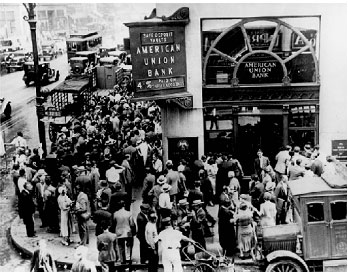
Source: American Union Bank, Wikimedia
Imagine that you are an American factory worker living during the 1920s. You work for years on the assembly line for the Ford Motor Company and place your wages in an account at your local bank. On October 30, 1929, you read about the stock market crash and fear that your bank may close. You run to your bank to withdraw your money from your account only to find that the bank is closed. How would you feel? Where would you go to get the money you needed to pay bills and feed your family?
This was the scenario for many Americans following the stock market crash of 1929.

Source: American Union Bank, Wikimedia
The failure of the banking system is another main cause of the Great Depression. After the stock market crashed, people panicked and rushed to withdraw their funds from the banks. Prior to the crash, banks participated in the practice of speculation buying, in which they often used investors' funds and lent money to individuals for the purpose of buying stocks. Investors could not repay what they borrowed, and banks could not repay the investors from whom they had borrowed.
After the stock market crashed, Americans feared that banks would soon fail. People immediately began to withdraw funds from their accounts, causing thousands of banks to close. As the panic of the bank runs continued to spread, more banks closed. By 1933, nearly half of the banks in the United States had failed.
In addition to the bank failures, the monetary policy of the Federal Reserve System (the Fed) contributed to the cause of the Great Depression. Read more about these policies below.
The policies of the Federal Reserve System caused the public to lose confidence in the banking system. People continued to withdraw cash from banks, deepening the Great Depression.
Ben Bernanke, Chairman of the Federal Reserve System, discussed the Federal Reserve System and its role in the Great Depression.
Interactive popup. Assistance may be required.
The "liquidationist" theory says the Great Depression was necessary to address the excess of the 1920s.
Interactive popup. Assistance may be required.
The Federal Reserve System responded to the Great Depression by tightening its monetary policy.
Interactive popup. Assistance may be required.
Some historians believe that the Federal Reserve System’s policies exacerbated the conditions of the Great Depression by increasing speculation in 1928 and 1929 and causing a decline in employment.